

How To Cite Social Media In Scholarly Writing. How To Cite Social Media In Research by TeachThought Staff Back in 2012, we shared how to cite a tweet.
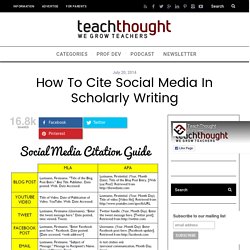
We followed that up with how to cite an app. So when we saw the very useful teachbytes graphic above making some noise on pinterest on several different popular #edtech websites, it reminded us of the constant demands changing technologies place on existing ways we do business. When and in what contexts it makes sense to cite social media content is probably a more relevant post than sharing a graphic that simply shows the format, but they’re both nice to have, yes? Citation Style Of course, citation style matters, and the two most popular are the APA and MLA. The APA (American Psychological Association) has their rules for citing social media in academic writing.
And to an extent, this makes sense. Digital Citizenship. on Pinterest. Resources for Teaching Digital Citizenship. Citizenship has always been a component of a well-rounded curriculum.
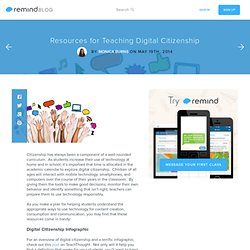
As students increase their use of technology at home and in school, it’s important that time is allocated in the academic calendar to explore digital citizenship. Children of all ages will interact with mobile technology, smartphones, and computers over the course of their years in the classroom. By giving them the tools to make good decisions, monitor their own behavior and identify something that isn’t right, teachers can prepare them to use technology responsibly. As you make a plan for helping students understand the appropriate ways to use technology for content creation, consumption and communication, you may find that these resources come in handy: Digital Citizenship Infographic For an overview of digital citizenship and a terrific infographic, check out this post on TeachThought.
Video on Digital Etiquette BrainPop is a fantastic site for helping students understand complex topics across the content areas. Curriculum: Understanding YouTube & Digital Citizenship – Google in Education. Overview We have devised an interactive curriculum aimed to support teachers of secondary students (approximately ages 13-17).
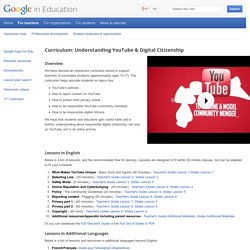
The curriculum helps educate students on topics like: YouTube’s policies How to report content on YouTube How to protect their privacy online How to be responsible YouTube community members How to be responsible digital citizens We hope that students and educators gain useful skills and a holistic understanding about responsible digital citizenship, not only on YouTube, but in all online activity. Lessons in English Below is a list of lessons, and the recommended flow for delivery. Or you can download the Full Teacher's Guide or the Full Set of Slides in PDF. Lessons in Additional Languages Below is a list of lessons and resources in additional languages beyond English: Learn more To learn more visit the Classroom videos page of this website, where you can find links to information on:
5 simple tips for turning teens into proper digital citizens. Teenagers live a very digital life.
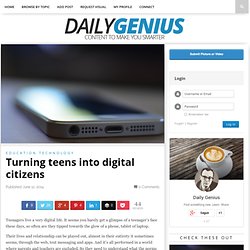
It seems you barely get a glimpse of a teenager’s face these days, so often are they tipped towards the glow of a phone, tablet of laptop. Their lives and relationship can be played out, almost in their entirety it sometimes seems, through the web, text messaging and apps. And it’s all performed in a world where parents and teachers are excluded. So they need to understand what the norms of behaviour are in these environments – what their responsibilities are with regard to dealing with each other and the tools they use.
This beginner’s guide addresses some of the basic issues. The Future of Learning How To Tackle Digital Citizenship at Your School. This article was originally published on Edudemic on August 19th.
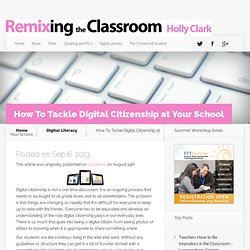
Digital citizenship is not a one time discussion. It is an ongoing process that needs to be taught to all grade levels and to all stakeholders. The problem is that things are changing so rapidly that it is difficult for everyone to keep up to date with the trends. Everyone has to be educated and develop an understanding of the role digital citizenship plays in our everyday lives.
There is so much that goes into being a digital citizen; from taking photos of others to knowing when it is appropriate to share something online. Our students are like cowboys living in the wild wild west. Create An Acceptable Use Policy WITH Your Students – Give Them a Voice Every September we pass out the obligatory Acceptable Use Policies with little thought to what they include.
For this discussion, think about digital citizenship in general, at school, at home and in transit. Discuss “Online Privacy” Be a Digital Citizen.